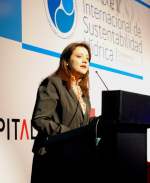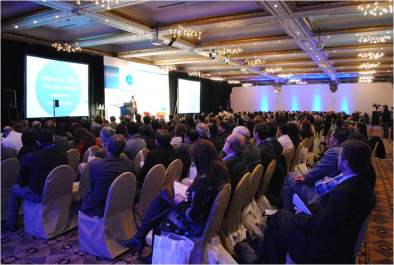The meeting was held simultaneously in five cities: Iquique, Arica, La Serena, Santiago, and Concepción, and was partially broadcast via streaming. GWP Chile supported the event, organized by the National Irrigation Commission of the Ministry of Agriculture of Chile (CNR) and the Latin American Association of Groundwater Development - Chilean Chapter (ALHSUD).
GWP South America shared its knowledge and experience through presentations and dissemination of technical publications. Maria Luisa Baltra, Chair of GWP Chile, encouraged teamwork and stressed the importance of Integrated Water Resources Management to achieve good results. Chile’s main actors on water affairs, including national authorities, signed a symbolic commitment to water care. The Summit revealed that the country is joining forces to work with a holistic view that transcends sectors. It is in this way that GWP Chile, with the support of GWP South America, will contribute to strengthen Chile’s effort towards integrated and sustainable water management in the coming years.
 GWP South America participated in two of the main cities: Santiago and Concepción.
GWP South America participated in two of the main cities: Santiago and Concepción.
In Santiago, Maria Luisa Baltra, Chair of GWP Chile and representative of Gabriela Mistral University, presented the purpose of the Global Water Partnership and its work around the globe and stressed the importance of IWRM to achieve sustainability. She introduced GWP Chile and urged to work together at country level. Referring to attaining progress, Maria Luisa expressed "It's a slow walk, but we must work together as a team."
She subsequently presented GWP Chile’s main lines of work: the water shortage situation in the country, communication and report on water affairs, drought effects on the development of economic activities and the analysis of the results of Chile’s water resources management assessment conducted by the World Bank. Afterwards, María Luisa Baltra participated in a round of questions from the audience, together with the French panelist Paul Haener, specialist from the International Water Office (OIE) of France. Relating to water in glaciers and the Antarctica, she clarified that although Chile is present in the latter, it cannot rely on its natural resources freely because the Antarctic Treaty, now in force for more than 50 years, seeks the protection of the frozen continent. She also highlighted Chile’s need to regulate and discuss basin management, a topic in which, she believes, experiences from other countries should be observed.
Meanwhile, in Concepcion, a city in southern Chile which had a turnout of about 150 people, the Chair of GWP South America and GWP Venezuela, Zoila Martinez, presented the recent case of the Basins Directorate of Carabobo State in Venezuela, which aims at managing the conservation of basins through public participatory policies focused on environmental education and sustainable development. Besides sharing its knowledge and experience through presentations, GWP South America also disseminated technical publications and informative material through its booth in the capital city of Chile, Santiago.
A symbolic commitment to water care was signed at the summit by the Minister of Public Works, the Sub-secretary of Finance, the Sub-secretary of Environment, the Executive Secretary of the National Irrigation Commission and the Chairs of the unions of the Production and Trade Confederation, the Chilean Chamber of Construction, the National Society of Agriculture, the Chair of the Association of Irrigation and Drainage, the Chair of the Latin American Association of Groundwater Development- Chilean Chapter (ALHSUD) and a representative of the legislative body of Chile.

